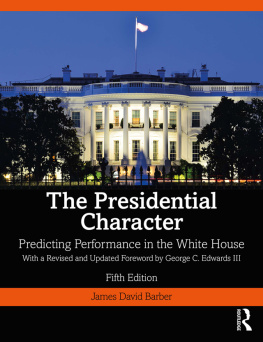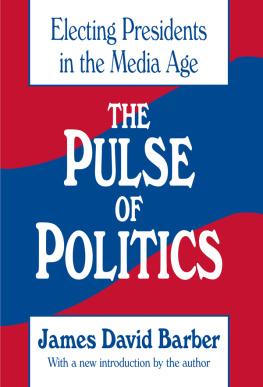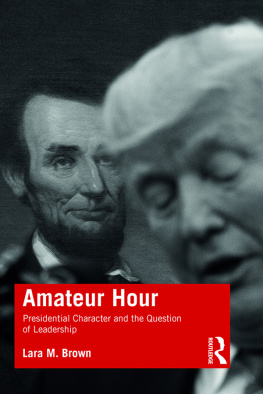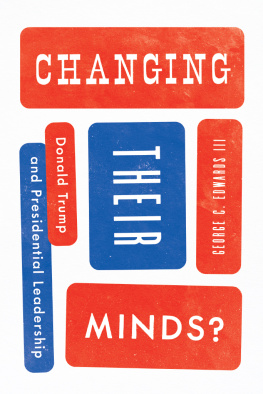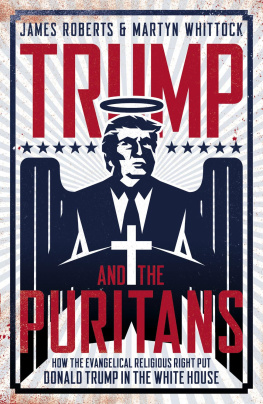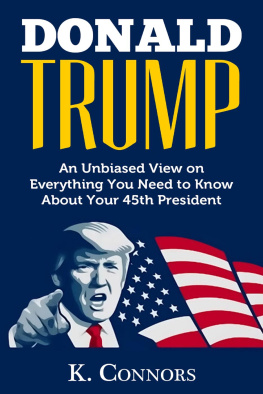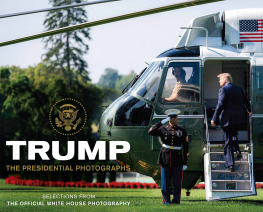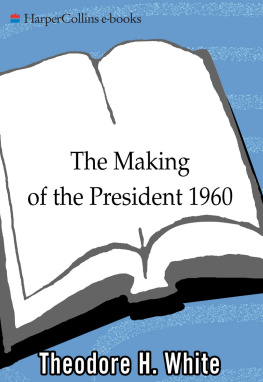The Presidential Character
A book entitled The Presidential Character is more timely and necessary than ever. This new issue of James David Barber's classic work appears almost 50 years after its first publication and yet reads like a roadmap to the 2020 presidential election. Its subtitle, "Predicting Performance in the White House," is an apt reflection on the election of 2016.
With a revised and updated foreword by George C. Edwards III that brings in the Trump Administration, this book argues that patterns in a person's character, world view, and political style can allow us to anticipate his or her performance as president. How would Barber have categorized Donald J. Trump, who appears to defy every presidential type and norm? This question suggests one of the most provocative and appealing reasons for students, scholars, and voters to re-read The Presidential Character at this particular juncture. What should we look for in a president? This text offers explanations and predictions of the performance of past presidents and presidential candidates with many cautionary tales looking forward.
FEATURES
- Presents a revised and updated foreword by presidential scholar George C. Edwards III, Distinguished Professor of Political Science at Texas A&M University, that includes the advent of the Trump Administration and highlights the book's classic and enduring contributions.
- Includes predictions of presidential performance from Nixon to Bush.
- Analyzes the media's role in providing information about the political candidates and in shaping public opinion of them.
- Draws on historical, biographical, and psychological research to help voters make judicious choices in determining the country's highest leaders.
- Encourages citizens to be actively involved scholars, critics, and participants in their government.
James David Barber was a Duke University political scientist and provocateur best known for exploring the psychology of Oval Office aspirants and occupants. He spent years as a consultant to "NBC Nightly News" and as a board member of the Poynter Institute, a center for the study of journalism and media ethics in St. Petersburg, Florida.
Praise for the Original Edition of The Presidential Character
"Given the imposing power of our Presidents today, there are few subjects of greater import; and Barber has written an important book on the subject."
Bruce Mazlish in The New York Times
"Comes closer to the truth about why presidents do what they do than any other author."
Hugh Sidney in Life Magazine
"The most original, most provocative, and most daring study of the presidency of the past decade... A major intellectual breakthrough."
James MacGregor Burns (late of Williams College and the
James MacGregor Burns Academy of Leadership of the School of Public
Policy at the University of Maryland)
The Presidential Character
Predicting Performance in the White House With a Revised and Updated Foreword by George C. Edwards III
Fifth Edition
James David Barber
For Skiff
Fifth edition published 2020
by Routledge
52 Vanderbilt Avenue, New York, NY 10017
and by Routledge
2 Park Square, Milton Park, Abingdon, Oxon, OX14 4RN
Routledge is an imprint of the Taylor & Francis Group, an informa business
2020 Taylor & Francis
The right of James David Barber to be identified as author of this work has been asserted by him in accordance with sections 77 and 78 of the Copyright, Designs and Patents Act 1988.
All rights reserved. No part of this book may be reprinted or reproduced or utilised in any form or by any electronic, mechanical, or other means, now known or hereafter invented, including photocopying and recording, or in any information storage or retrieval system, without permission in writing from the publishers.
Trademark notice : Product or corporate names may be trademarks or registered trademarks, and are used only for identification and explanation without intent to infringe.
First edition published by Prentice Hall, Inc. 1972
Fourth edition published by Routledge 2009
Library of Congress Cataloging-in-Publication Data
Names: Barber, James David, author. | Routledge (Firm)
Title: The presidential character : predicting performance in the White House /
James David Barber, with a revised and updated foreword by George C.
Edwards III.
Description: Fifth Edition. | New York : Routledge, 2020. | First edition
published by Prentice Hall, Inc. 1972. Fourth edition published by
Routledge 2009T.p. verso. | Includes bibliographical references.
Identifiers: LCCN 2019029849| ISBN 9780367366780 (Hardback) |
ISBN 9780367366773 (Paperback) | ISBN 9780429348075 (eBook)
Subjects: LCSH: PresidentsUnited StatesCase studies. | Prediction
(Psychology)
Classification: LCC JK511 .B37 2020 | DDC 352.230973dc23
LC record available at https://lccn.loc.gov/2019029849
ISBN: 978-0-367-36678-0 (hbk)
ISBN: 978-0-367-36677-3 (pbk)
ISBN: 978-0-429-34807-5 (ebk)
Typeset in Stone Serif
by Apex CoVantage, LLC
Foreword
George C. Edwards III
James David Barber's The Presidential Character first appeared in 1972, just as Richard M. Nixon was finishing his first term. Two years later, Nixon resigned from the presidency as a result of the Watergate scandal, for which he faced almost certain impeachment and removal from office. Rightly or wrongly, Barber's analysis of Nixon has been credited with predicting his ultimate downfall. Faced with the current presidency of Donald J. Trump and threats of impeachment, the perennial relevance of the core concern of Barber's book can scarcely be overstated.
Writers have long debated the great man interpretation of history. The two sides of this issue assumed their best-known forms in the nineteenth century. In Heroes and Hero-Worship and the Heroic in History , published in 1841, Thomas Carlyle argued that great men alone were responsible for the direction of history. To Carlyle, the environment of the hero was generally malleable and thus receptive to leadership. Viewing history from quite a different perspective, various schools of social determinists, including the Spencerians, Hegelians, and Marxists, saw history as an inexorable march in one direction, with change occurring only when the culture was ripe for it. They concluded that great men could not have acted differently from the way they did. Leo Tolstoy's portrayal of Napoleon in War and Peace is perhaps the most memorable depiction of this view.
We need not resolve this ancient debate, and there is evidence on both sides. Contemporary scholars, including myself, have concluded that important arenas of presidential leadership such as the public and Congress are constrained by institutional fundamentals, the nature of public opinion, and broader historical forces.
On the other hand, it is common to argue that it makes a difference who the president is. For instance, commentators often offer the example of the attempted assassination of President-elect Franklin D. Roosevelt on February 15, 1933, to make the point. If anarchist Giuseppe Zangara had succeeded in assassinating Roosevelt instead of Chicago Mayor Anton Cermak, they argue, the history of the United States would have been different.
This example reflects that fact that although presidents may not be able to persuade others to do their bidding, they have substantial discretionary authority. They are free to make a wide range of decisions that may determine war and peace, economic growth, the protection of civil liberties and the environment, access to health care, and many other crucial aspects of life in the United States. There is nothing more important to understand about the presidency than decision making. Decisions are what make presidents unique.

